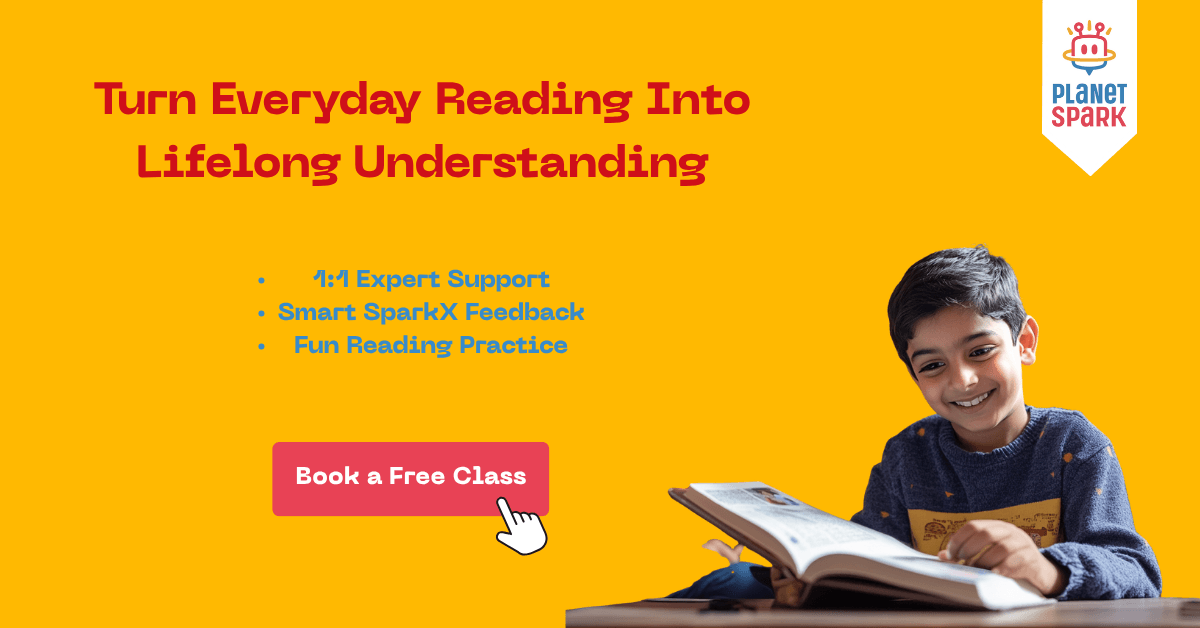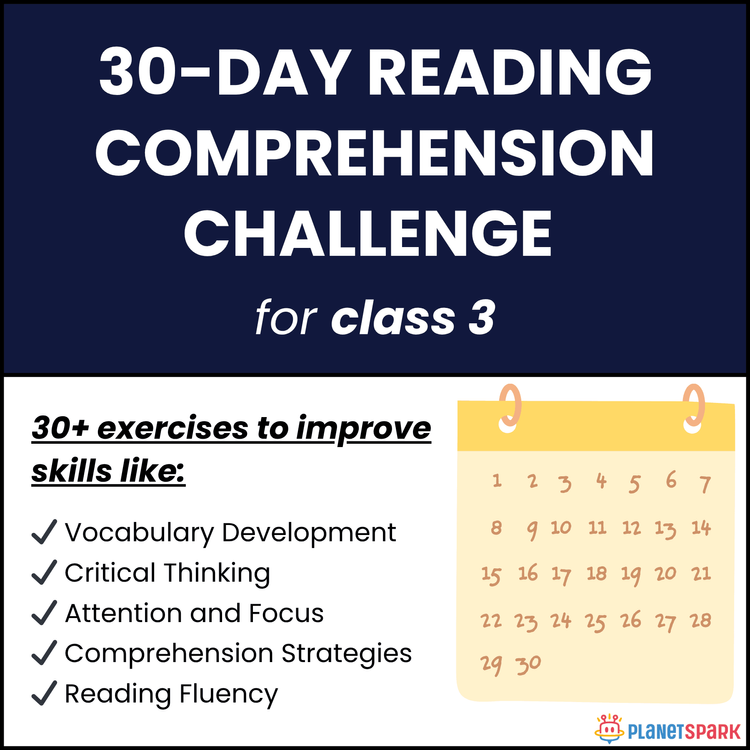Top 10 Benefits of English Reading Comprehension for Kids
Last Updated At: 8 Aug 2025
10 min read

Reading is more than just saying words out loud; it’s about understanding what they mean. That’s where English reading comprehension becomes essential, especially for kids. It helps them think clearly, learn faster, and enjoy stories in a meaningful way.
At PlanetSpark, we help children build strong reading habits that boost comprehension and confidence through engaging, level-based activities.
In this blog, we’ll explore the top benefits of English reading comprehension for kids and how it shapes their learning journey.
Top 10 Benefits of English Reading Comprehension for Kids
Strong reading comprehension lays the foundation for a child’s academic success and personal growth. Let’s look at the top 10 benefits every parent should know:
1. Improves Focus and Attention Span
Comprehension encourages kids to follow along with stories, understand details, and make sense of what’s happening. Unlike passive reading, it demands attention and involvement. As they try to connect ideas or predict what comes next, their focus naturally sharpens. Over time, this trains them to stay attentive not only while reading but also during lessons, conversations, and other learning tasks.
Example: If your child can focus long enough to follow a mystery story, they are also likely to pay closer attention during a science experiment or maths word problem.
2. Expands Vocabulary Naturally
Instead of learning words in isolation, comprehension helps children understand new vocabulary through context. This makes learning more meaningful and long-lasting. For instance, a child might not know what “enormous” means, but after reading, “The elephant was enormous, bigger than a house,” they are likely to remember it easily.
Bonus Tip: Encourage your child to keep a “new word” notebook where they write down interesting words from stories and their meanings.
Unleash Your Child’s Reading Power
Book a free demo class with expert educators today!
3. Builds Stronger Academic Skills Across Subjects
English comprehension is helpful across all subjects, not just in language class. Subjects like science, history, and even maths involve instructions, questions, and long-form texts. Children who can read with understanding perform better because they know what is being asked and can extract important details quickly.
Example: A child who can easily read a science passage about animals will find it easier to answer questions in their own words or explain concepts clearly during an oral test.
4. Encourages Independent Learning
Once children realise they can understand books on their own, they gain the confidence to read more without needing help. This creates a habit of self-learning. Whether it’s a storybook, an article, or an online guide, comprehension allows them to explore knowledge independently.
Parent Tip: Leave age-appropriate books around the house, especially ones related to your child’s interests. This could include books on dinosaurs, cooking, space, or sports.
5. Strengthens Critical Thinking and Reasoning
Comprehension helps kids go beyond just reading the words. They begin to ask questions like, “Why did this happen?” or “What could happen next?” These habits develop reasoning skills that are useful not only in school but also in daily decision-making.
Example: If a story talks about a character facing a tough choice, your child may start thinking about different solutions and outcomes. This is a great way to build logical thinking.
6. Boosts Writing and Expression Skills
When kids understand sentence structure, vocabulary, and tone through reading, they naturally start using these elements in their own writing. Reading comprehension gives them models of how to explain ideas, describe events, and build stories.
Result: Children who read and comprehend regularly are more likely to write well-organised essays, creative stories, and stronger school answers.
7. Builds Confidence in Speaking and Discussion
Understanding what they read gives kids the ability to talk about it clearly. Whether it’s narrating a story to friends, answering questions in class, or sharing ideas during a group discussion, comprehension builds speaking confidence.
Real-Life Benefit: A child who can explain a story well is more likely to participate actively in elocution contests, storytelling sessions, or public speaking events.
8. Helps with Emotional Understanding and Empathy
Reading comprehension allows children to connect with characters and understand their emotions. This helps them recognise feelings in others and respond with empathy in real life.
Example: A story about a child dealing with loneliness or fear can help your child understand those emotions and become more caring and thoughtful.
9. Fuels Imagination and Creativity
When kids truly understand what they read, their minds start to visualise scenes, imagine voices, and even create new endings. Comprehension turns reading into a vivid and imaginative experience, which boosts creativity in many areas of life.
Parent Tip: After reading a story, ask your child to act it out or draw a scene. This is a fun way to encourage both comprehension and creativity.
10. Prepares for Real-World Communication
Strong comprehension skills help children understand everyday content such as school notices, digital messages, instructions, and signs. This ability gives them confidence and independence in real-world situations.
Long-Term Impact: Whether your child becomes a doctor, entrepreneur, artist, or engineer, comprehension skills will support effective learning and communication at every stage of life.

See the Difference in One Session
Claim your free PlanetSpark class now.
Features of Good Reading Comprehension
Strong English reading comprehension for kids involves more than just finishing a book. It means children can understand, connect, and think critically about what they read. Here are the key features of good comprehension skills every parent should look out for:
1. Understanding the Main Idea
Children with strong reading comprehension skills can identify the central message or theme of a passage. This shows they are not just reading words, but grasping the meaning behind them.
Example: After reading a story, your child says, “This was about how the rabbit learned to be brave.”
2. Noticing Key Details
Good comprehension includes remembering facts, names, timelines, and specific events. Children should be able to recall these details without re-reading.
Tip: Encourage your child to highlight or underline important points while reading.
3. Making Personal and Textual Connections
Kids who comprehend well often relate the text to their own life or to other books, movies, or lessons. This type of thinking deepens their understanding.
Example: “This reminds me of the story we read in school,” or “That character is like my cousin.”
4. Making Inferences and Predictions
One important feature of reading comprehension for kids is being able to read between the lines. Good readers predict what might happen next or understand feelings that aren't directly stated.
Try This: Ask your child, “Why do you think the character acted that way?”
5. Learning Vocabulary from Context
Children with strong English reading comprehension often guess the meaning of unfamiliar words by using clues in the sentence or paragraph. This is a powerful strategy for growing vocabulary naturally.
Example: In “The little boy was famished after school,” they understand “famished” means very hungry based on the context.
6. Summarising and Retelling
A child who can retell the story in their own words shows real understanding. Summarising builds memory, sequencing skills, and clarity of thought.
Parent Tip: After reading, ask your child to explain what happened in three simple sentences.
7. Asking and Answering Meaningful Questions
Children with good comprehension ask thoughtful questions and answer “why” or “how” questions with clarity. These are signs that they are truly engaging with the text.
Prompt Them: “What would you have done if you were the main character?”
8. Understanding Purpose and Tone
Advanced reading comprehension strategies for kids include recognising why something was written to inform, entertain, or persuade. Kids also learn to sense the author’s tone, such as whether the passage is serious, funny, or emotional.
Example: “This story was written to make people laugh,” or “It was a true story about nature.”
By identifying these features in your child’s reading habits, you can better support their journey to becoming strong, confident readers.

Build Strong Reading Habits Early
Book a free demo and get your child started today.
Common Challenges in Reading Comprehension and How to Overcome Them
| Challenge | What It Looks Like | How Parents Can Help |
|---|---|---|
| Lack of Focus While Reading | Child skips lines, gets distracted, or rushes through the text | Choose short, engaging stories. Read aloud together and ask questions during reading to keep their attention. |
| Limited Vocabulary | Child struggles to understand unfamiliar words and often guesses wrongly | Introduce new words gently while reading. Use visual cues and discuss meanings using real-life examples. |
| Difficulty Remembering What Was Read | Child forgets the story or details right after reading | Ask them to retell the story in their own words. Use drawings or story maps to help them recall events. |
| Struggles with Inference | Child takes everything literally and misses implied meanings | Practice with simple “why” or “how” questions. Start with picture books or comics to develop inference gradually. |
| Poor Understanding of Sentence Structure | Child misreads or misunderstands complex sentences | Read slowly together. Break long sentences into smaller parts and explain word by word if needed. |
| Low Confidence in Answering Questions | Child hesitates or says “I don’t know” even when they understood the text | Start with easy questions and praise their efforts. Build confidence through positive reinforcement. |
| Boredom or Disinterest in Reading | Child avoids reading time or says books are “boring” | Offer books related to their interests like sports, animals, or superheroes. Allow them to choose what to read. |

How PlanetSpark Helps Improve Reading Comprehension
PlanetSpark’s reading program helps children build strong English reading comprehension skills through:
Level-based reading: Stories and passages matched to your child’s ability for steady progress
Interactive sessions: Fun discussions and activities that deepen understanding
Vocabulary building: Context clue strategies to learn new words naturally
Expert guidance: Personal feedback to strengthen comprehension
Confident expression: Storytelling and speaking activities that boost clarity
With PlanetSpark, children enjoy reading and grow into confident communicators.
Conclusion
English reading comprehension is more than just a school skill, it builds a child’s ability to think, speak, and learn independently. From improving vocabulary to enhancing focus and critical thinking, the benefits shape academic performance and everyday confidence. With the right support and regular practice, every child can become a strong reader and communicator. Help your child take the first step towards reading success with structured learning and engaging stories.
Readers Also Read
Reading Comprehension for Class 4
Explore fun passages and helpful tips to improve reading skills in Class 4.Reading Comprehension for Class 3
Simple strategies and examples to build strong reading habits in Class 3 students.
Frequently Asked Questions (FAQs)
1. Why is English reading comprehension important for kids?
It helps children understand what they read, boosts academic performance, and strengthens thinking and communication skills.
2. At what age should kids start practicing reading comprehension?
Children can begin as early as age 5 with picture books and simple questions to develop understanding gradually.
3. How can I improve my child’s reading comprehension at home?
Read together regularly, ask open-ended questions, and use interactive reading tools to make learning engaging.
4. What are signs that my child is struggling with comprehension?
Skipping words, poor recall, limited vocabulary, and avoiding reading tasks are common signs.
5. Can PlanetSpark help improve reading comprehension?
Yes, PlanetSpark offers structured reading programs designed to build comprehension, vocabulary, and confidence through expert-led sessions.
Download Free Worksheets
Personalized Communication Report
Record a video to get a AI generated personalized communication report for your child
Select Learner's Class

Hi There, want to try these
tips for your child with
LIVE with our expert coach?
Let's check your child's
English fluency

